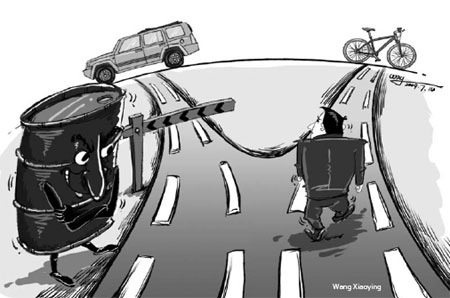
|
BIZCHINA> Review & Analysis
 |
|
High gas prices good for economy, ecology
By William Daniel Garst (China Daily)
Updated: 2009-07-15 15:56 Gas prices have gone up yet again in China. While rising fuel prices are bound to upset motorists, it is a good public policy both from the economic and environmental points of view. The increase in fuel prices will address two of Beijing's biggest problems: chronic traffic congestion and air pollution. We expatriates have a standing joke that the Third Ring Road is the capital's longest parking lot. On a more serious note, the continued increase in the number of vehicles in Beijing threatens to offset the recent improvement in air quality after factories were moved outside the city. Beijing's municipal government has sought to address the problem by re-imposing the odd-even system of driving introduced before the Beijing Olympic Games. But the system doesn't seem to have had much effect on the commuting behavior of families with two cars with odd- and even-numbered license plates. For example, a Chinese colleague in the State-owned enterprise - a subsidiary of China National Petroleum Company (CNPC) - where I work in Beijing has a car with an odd-number plate, while her husband has one with an even number. She told me recently that they drove to work every day by switching their cars to comply with the odd-even traffic regulation during the Olympic Games. The economic theory that people respond to price incentives, along with empirical evidence, shows there is only one surefire way to get people to drive less and use more fuel-efficient vehicles. And that can be achieved by raising the cost of driving. The US experience clearly bears this out. After the first oil price shock of the 1970s, the US government mandated average fuel-efficiency standards for automobiles (CAFE levels) to reduce gas consumption. The result: during the late 1970s, when oil prices were still high and gasoline was relatively expensive, US automobiles' fuel efficiency improved markedly.
 But during the 1980s when energy prices hit historic lows after being adjusted for inflation, the sales of gas-guzzling SUVs, exempted from CAFE standards, soared. Growing suburban sprawls in US cities led people to drive more, increasing traffic congestion and commuting time for motorists. The recent increase in gasoline prices in the US, which jumped to above $3 a gallon in 2007 - gas was below $2 a gallon in 2005 - has helped reverse these trends.
Since car ownership is a new phenomenon in China, I suspect many Chinese drive to work or other places not because traveling by car is the only or best way to get from point A to B, but because they want to drive their newly bought vehicles as much as possible. For instance, one day a foreign colleague visited CNPC's research facility just beyond the Sixth Ring Road in southeast Beijing. On his way back, a Chinese colleague offered to give him a ride in his car and drop him off at Dongzhimen, from where he could take a bus back home to Shunyi.
While their car was stuck in one of the many jams, my foreign colleague wondered why would a person spend more money to drive a car and still reach half an hour later than what a much cheaper public transport would take. He got his answer from the Chinese colleague who said he wanted to drive as much as possible because he liked having a new car and using it -- and he wanted to do all the driving before gas prices rose. Thus fuel prices should be raised if we want to reduce the number of vehicles on the roads. Rising fuel prices will not do any harm to people who use public transport. Besides, unlike most American urban-dwellers, Beijingers have access to a pretty good transport system, and it is improving rapidly. The increase in fuel prices should prompt more and more people to take advantage of such a system. That will be good not only for the city's traffic, but also its air quality. The author is a Sinologist, and teaches at Jintai Academy and Peking University. (For more biz stories, please visit Industries)
|
|||||
亚洲av综合avav中文| 亚洲AV日韩AV永久无码久久| 久久亚洲AV成人无码国产 | 亚洲日韩精品无码一区二区三区 | 国产精品午夜无码AV天美传媒 | 人妻丰满熟妇aⅴ无码| 中文字幕乱妇无码AV在线| 午夜无码国产理论在线| 亚洲精品无码久久久久sm| 中文成人久久久久影院免费观看| 中文字幕在线无码一区| 人禽无码视频在线观看| 一区二区三区人妻无码| 亚洲AV中文无码乱人伦在线视色 | 中文字幕日韩欧美| 国产中文字幕在线| 日本阿v视频高清在线中文| 99久久人妻无码精品系列| 无码日韩人妻精品久久蜜桃| 亚洲成A人片在线观看中文| 欧美视频中文字幕| 高清无码中文字幕在线观看视频 | 人妻无码αv中文字幕久久| 五十路熟妇高熟无码视频| 日韩精品无码一区二区三区不卡| 亚洲中文字幕无码一久久区| 无码H黄肉动漫在线观看网站| 人妻无码人妻有码中文字幕| 日本乱人伦中文字幕网站| 在线中文字幕播放| 色综合网天天综合色中文男男| 国产中文字幕视频| 最近最好最新2019中文字幕免费| 最近中文字幕电影大全免费版| 最近2019在线观看中文视频| 日韩乱码人妻无码中文字幕视频 | 亚洲色无码专区在线观看| 白嫩少妇激情无码| 国产色无码精品视频免费| 亚洲国产精品无码久久久蜜芽 | 国产办公室秘书无码精品99|